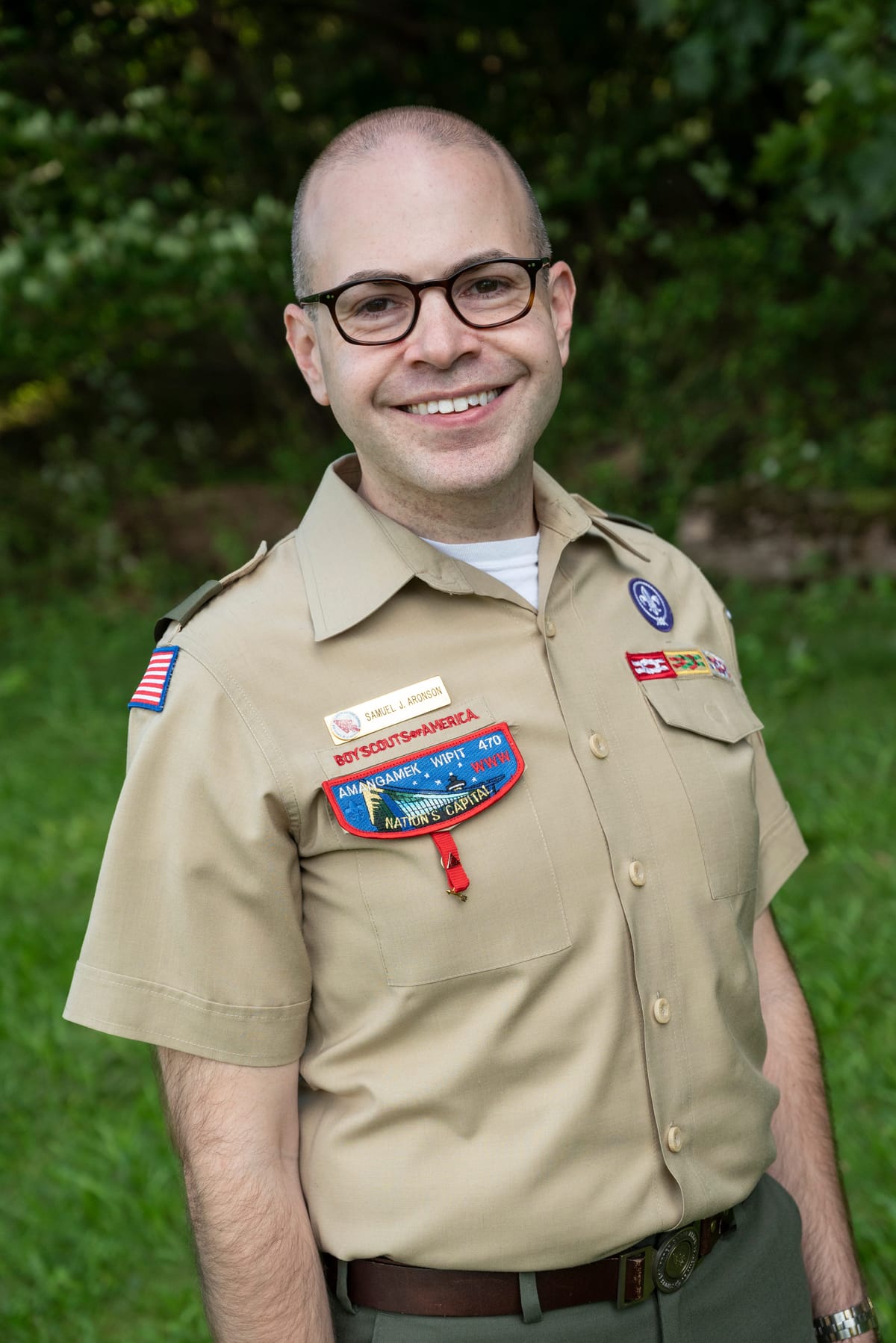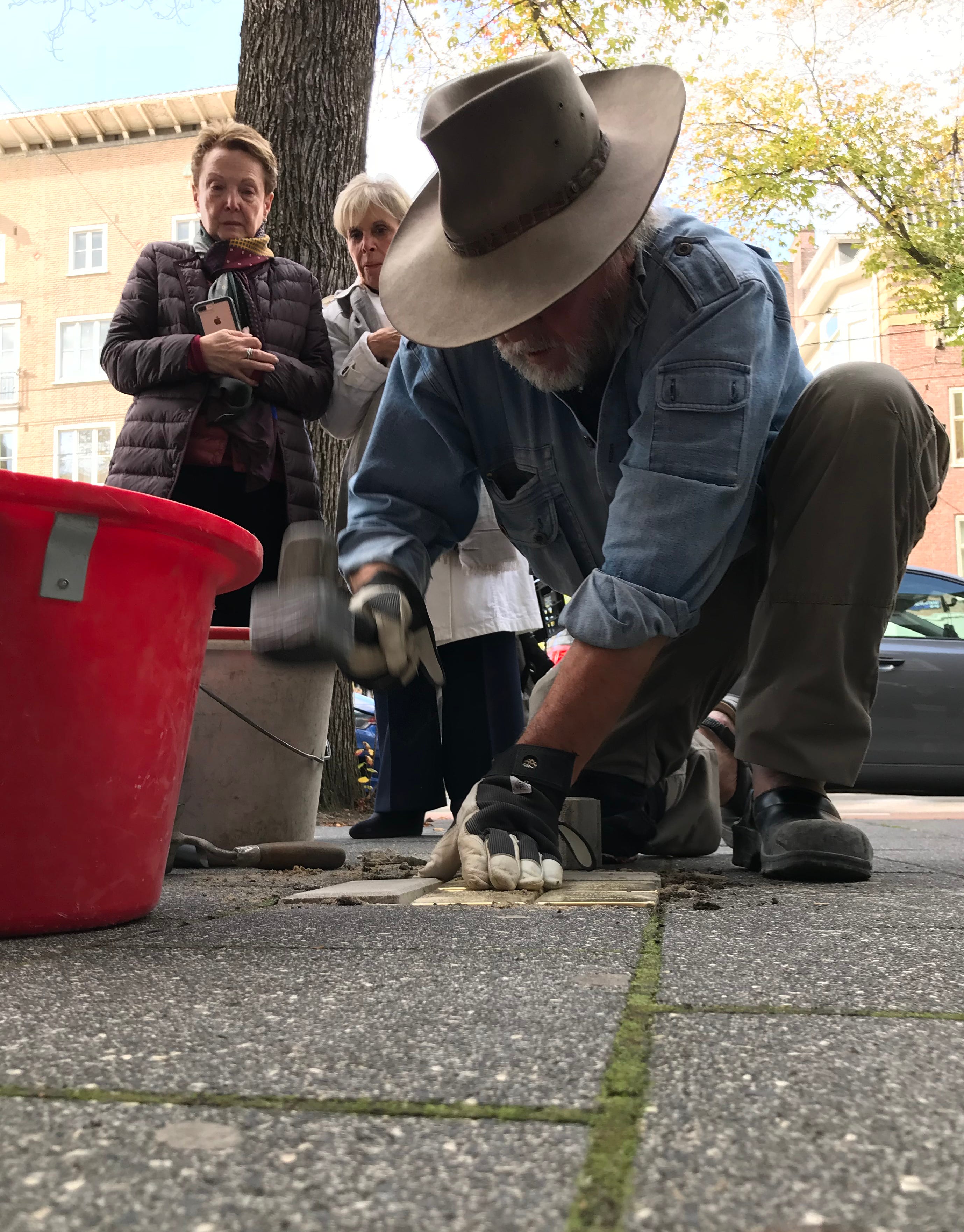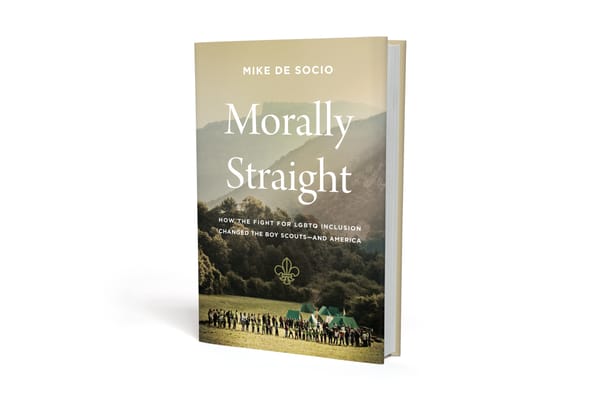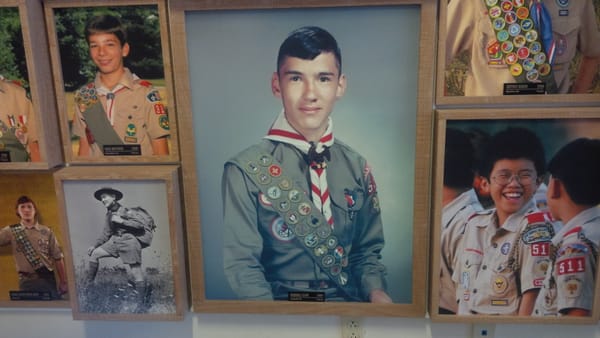Guest Essay: What’s Past Can Be Prologue
How can Scouting making amends for the harm it has caused to marginalized communities? Sam Aronson argues that it starts with being honest about that harm, but also includes celebrating our heroes.

This month’s deep dive is a guest essay from Sam Aronson. I interviewed Sam in an earlier edition of this newsletter, and I’ve invited him back to share his perspective. Please note: Opinions expressed by guest authors are solely those of the author, and do not necessarily reflect the views of Morally Straight. — Mike De Socio
My work-life as a university dean and Holocaust scholar, and my volunteer-life with the Scouts, rarely intersect, but lately I’m starting to hope they do. A little over one year ago the BSA released a statement, publicly committing itself to combating racial injustice and making real changes to strengthen our program by adding rank requirements, a new Eagle-required merit badge, and mandatory training for adult leaders to understand how to create a safe and welcoming environment for every scout. I had the great pleasure, and honor, and crippling-fear, of being an author of the merit badge, and a reviewer of the advancement requirements and adult leader training. When some of these drafts were shared with “the field” (as BSA professionals call our broader membership) we received a wide variety of responses. Some thoughtful and helpful. Others … not so much.
A common theme from those who were totally opposed to any of this work was not an edit to improve the content, but an affirmative declaration that there is no place in Scouting for diversity work.We don’t need this because we are all scouts, they argued, and that is the only identity that really matters. All of this other “stuff” is just a distraction designed to make straight white men feel bad, they warned.
The policies the BSA had in place for decades excluding LGBTQ+ Scouts, women, and people of color were not genocidal. Period. However, I’ve come to realize there is much Scouting can learn from modern Germany.
When I started devoting the bulk of my Scouting time to diversity work I was surprised to hear how defensively and angrily many of our members reacted to some very low-cost (yet high-impact) steps the BSA could take to make life better for our most vulnerable populations. Encouraging the use of pronouns or apologizing for policies of exclusion costs next to nothing, but the blowback from those suggestions stunned me. Then I remembered, as a historian it’s clear to me that no person, organization, or country, wants to look at the unpleasant or shameful parts of their past. That’s just human nature. The same is true for Germany. For decades after World War II many Germans cast themselves as victims of Nazism, and not collaborators or perpetrators. Today Germany is the gold-standard for repairing harm. What changed?
In the 1960’s a period of civic engagement began in Germany when young people born after the war began to question the narrative the older generation used to excuse their own complicity in the crimes of the Nazis. These young people who sought to understand, and make amends for their countries history, were called Nestbeschmützer, or “nest-foulers.”
These nest-foulers began a process in Germany called Vergangenheitsaufarbeitung, literally “working off the past,” and the BSA should follow that example. The first step the BSA must take to work off its past is to specifically acknowledge its mistakes and apologize for the pain inflicted on countless young people who were told they were unwelcome because of an intractable part of their identity. When attorneys for the BSA argued in the Supreme Court of the United States that the BSA should be allowed to exclude LGBTQ people from Scouting, they cited the Scout Oath and Law, intentionally misrepresenting what it means to be “morally straight” and said that gay peple were not “clean.” The BSA has reversed this policy, but never apologized for these hurtful messages. That should be step one.
In Germany the process of working off the past is not confined to the government alone, but is a community-wide endeavor. Just as the crimes of the Third Reich were massive and wide-spread, so is the repair. In 1992 a German artist launched the Stolperstein or Stumbling Stones project, where a small brass plaque is installed in front of the homes where Jews and other victims of the Nazis lived before they were deported and murdered. This is now the largest decentralized monument in the world, with plaques all over Europe. In many parts of the country it’s a citizen-financed project, meaning if you want to put a stumbling stone in front of your house you have to research the history of the people who lived there, obtain permission from city hall, and pay for the installation yourself.

It’s incumbent upon individual units, troops, crews, ships, lodges, chapters, and committees to take it upon themselves to correct for the actions done in their names. Individual units can draft and commit themselves to diversity statements. Leaders should educate themselves to ensure they’re creating a welcoming and affirming space for every scout. Commissioners can partner with local churches and schools with majority-minority populations to find community champions for Scouting. Service projects could benefit communities previously excluded by the program. Right now the onus is on harmed communities to find Scouting where a “space can be made for them.” Who wants to be that person, merely tolerated in a space clearly not designed for them? If we’re going to work off the past, it must be intentional and not delegated to faceless bureaucrats in Dallas.
The scale of any repair must be equal to the scale of the injury for it to have any meaningful impact. For decades Scouting worked hard to keep people out (we are certainly now reaping the spoils of those mistaken and hurtful policies.) Now is the time to be as explicit and intentional about correcting those errors as we were making them. How many hundreds of thousands of dollars did we spend defending bigotry in the Supreme Court? Has our repair of that wound been equal to the injury?
This process is not foreign to the BSA; in fact, the BSA has been a model of how to do a repair like this correctly. In response to the tens of thousands of cases of child abuse inflicted upon scouts, the BSA is following the right model for repairing the injury. The BSA has apologized to the victims of abuse and committed itself to paying for their medical treatment for the rest of their lives. Scouting has created a suite of youth protection resources which are considered the gold-standard for any youth-serving organization to ensure abuse is prevented moving forward. We have a nation-wide hotline to report abuse, and finally the BSA will provide financial compensation to the victims of this abuse.
There is no fully satisfying way to make amends for trauma, but that doesn’t absolve the perpetrator from striving to repair those injuries. I know there are those who think this is all about making people feel ashamed of the BSA, but that couldn’t be farther from the truth, which brings me to my last point of comparison to modern Germany: celebrate your heroes. Just as I want Scouting to be honest about its injuries, and take seriously the work of repairing those injuries, we should also celebrate and thank those who worked to make Scouting more welcoming. Think of the kind of message it would send to present James Dale with a Silver Buffalo, thanking him for being an honorable Scout and asking our organization to live up to the best version of itself. We should remember and commemorate the pain, but also celebrate the triumphs.
This work isn’t about making anyone feel ashamed to be a scout, it’s about being honest with ourselves, and giving everyone a reason to see the organization flourish long into the future.


